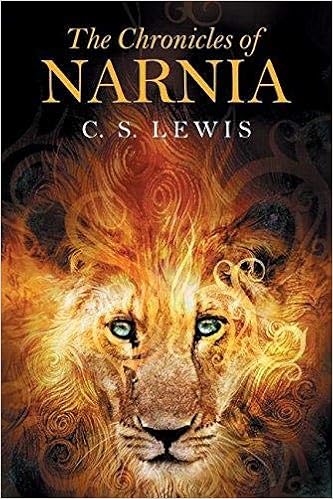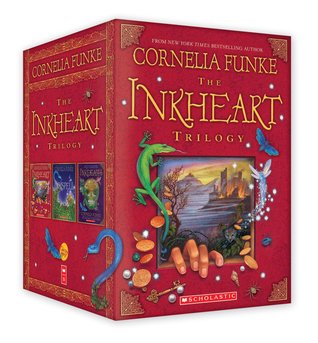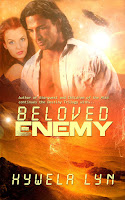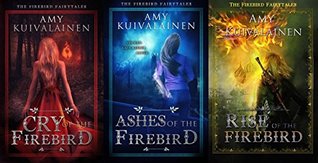Welcome to the next stop in the OWS CyCon Urban Fantasy Blog Hop! I hope you enjoyed exploring "The Fantasy of Reality" with Megan O'Russell. Now, get ready to enjoy something a little different, as I explore the impact of fantasy in the "real world" of my own life.
<<<<<<<<<<<>>>>>>>>>>
Has this ever happened to you?
You're walking along a sidewalk, going about your normal day, when the sunlight glints off something on the pavement. You stop and peer a little closer. It's a ring, a very pretty, expensive-looking ring. Intrigued, you pick it up. It looks to be about your size, so you try it on.
The minute the cool metal touches your skin, a breeze hits your face out of nowhere and you blink--and you're standing in the middle of a wood, with tall trees, lush grass, a babbling brook, and no sign of human interaction anywhere.
Not your style?
Well then, how many times have you gone exploring in an unfamiliar wood, expecting to see the crumbling ruins of an abandoned castle buried deep within?
Just me? Okay, fine.
The point is, whether or not the magic we read about in books or see in movies is the same sort we can expect to experience in our everyday lives (spoiler alert: it isn't), there is still a host of valuable lessons we can learn from watching and reading and "experiencing" these flights of fancy in our imaginations. Fantasy has a way of imbuing the most mundane activities with fresh new life--and seeing the difference between the "real", magic-less world and the one where magic lives freely is a remarkable thing to behold.
As you might have guessed by now, I'm a voracious and avid reader (See THIS post from earlier this week and also check out the Reader's Review page to see just how serious I am) and one of the genres that has long been my favorite is fantasy. Most people read fantasy because they want to "escape reality." They assume this, because that is what the characters seem to be doing--they have a miserable circumstance in their life, or things are just too boring--and the minute something happens the least bit out of the ordinary, they jump at the chance to chase after that extraordinary thing.
But look deeper. Is it merely escape? Or are there important lessons that the character learns--amid the dancing fairies, the impossible unfurling before their eyes, and the talking animals--that end up making them a better person, once they return to the "real world"? Wouldn't that be a far greater benefit, and a reason to read more fantasy: to better understand what lies at the heart of the thing we struggle with, and to gain a new perspective on how to handle it?
To that end, I wanted to talk about five different fantasy tales (not all of them are books, there's a few movies in it, as well) that I encountered, which taught me valuable lessons that impacted my perspective on the real world. Each of them used the "real world vs. alternate world" duality, so I'll be expounding how the story used the two worlds, and the lesson this method communicated.
Ready to go? Let's begin!
1. Stardust
The first fantasy tale we will look at is Stardust by Neil Gaiman. Specifically, the film based upon his novel. (Didn't much care for the novel, for a variety of reasons...) In it, the "normal" world and the fantastical are separated by a long, ancient Wall. The Wall had been there for so long, people forgot what it was for. In fact, the very name of the village was "Wall", since it was the only village right next to this anomaly. People from Wall didn't cross the Wall, and people from the magical world just on the other side of the Wall--called Stormhold--didn't ever cross into the normal side. The way it was set up, one couldn't exactly tell if the magical world was still on Earth, or if it was a separate dimension. Things that happened in Stormhold could be seen from Wall--but everyone would dismiss what they saw as a quirk of nature. The big important event that sets off the whole plot of Stardust has to do with a young man from Wall crossing over into Stormhold, meeting a girl, having a child that was half "normal", half "magical", and that child finding out about their heritage--among other things. The important thing to note was that this fantastical masterpiece stemmed from a simple wall in the middle of a relatively empty field. One need only to wonder: "Why is it there? Is it to keep something in--or to keep something out? Who put it there? What's really on the other side?" And there would be no stopping that sort of inquisitive mind.
The lesson I learned from Stardust was this: "You never know what could be, beyond the scope of your experience." After watching the film and experiencing the story, I found myself drawn to the small spaces, the little details most other people would ignore: a random door on the side of a building, a barricade in front of an empty field, or even an abandoned building lot. Who knows what amazing secrets these places hid? What if there was a magical dimension, just waiting on the other side, concealed from the casual eye? It gave me appreciation for these small moments, and even some sights found their way into my stories, sometimes. There was, quite literally, a story around every single corner, I found.
2. Mr. Magorium's Wonder Emporium
This film was cheesy, and kind of fluffy--but it was also cute and magical and so I kind of felt like it was a "guilty pleasure" for me. In this film, there aren't two separate worlds, but an unassuming toy shop in the "real world" seems to possess magical properties, as the toys themselves come to life and interact with the children who play with them, the impossible is possible, and it's always full of life and color and movement--until the Grumpy Adult comes to try and shut it down, showing an incredible lack of imagination, whereupon the shop loses its life and color, and the toys become dull, inanimate objects again. Therein lay the contrast of the two "worlds" in this film: one was dark and empty and still; the other bouncing, vibrant, and full.
Now here's the profoundness in the way such a quaint and silly movie taught a powerful lesson. Was it "Adults are boring and need to have more fun"? No. It could have taught that being impulsive and refusing to live by any sort of rules is the only way to live... but it didn't. Instead, my takeaway from the film was that "A life without imagination is no life at all." It wasn't that "rules are evil" or "believe that something will happen and magically, it will", but that within the set guidelines for cooperating well with others and functioning as a community, a little imagination is to be embraced as a way to enhance one's life, not shunned or feared as useless daydreaming. For me, that meant that allowing my mind to wander a little bit, as long as my ideas brought benefit and not harm, could actually serve to benefit me and others. I don't need to be ashamed of my ideas, or pursuing the fantasy and science fiction topics I am passionate about. A little whimsy makes the world go round!
3. Chronicles of Narnia
This series is perhaps the most foundational of all the fantasy I read and loved. I read these books over and over, almost to the point of memorization, and even went on to write my own spin-off fanfiction trilogy based on the series! In this series, the "real world" and the fantasy world--Narnia--are presented as in separate dimensions, accessible only through certain "portals", such as a wardrobe, or a magic ring. Four siblings pass many years in both the real world, and a few centuries in Narnia, growing learning, ruling, and every time they returned to the real world, it was as if no time had passed at all. Each book in the 7-book series features either a couple of siblings from this family, or later on a cousin and his friend, going back to Narnia and having adventures until the magic world literally comes to an end, with surprising implications for this world.
A lot could be said about the fact that the author of said series was an inquisitive theologian, writing a straight-up allegory disguised as a kid's fantasy adventure... but really, the impact it had on me didn't really surface until I was writing that trilogy I mentioned earlier. In the trilogy, the siblings are all older, and I really went after the contrast between the siblings who chose to still "believe" in Narnia, even when they were "too old" to continue returning there, and the one who ended up rejecting the whole idea, even scoffing at the others for still treating their experiences as real memories. I began to realize something very important that wasn't exactly mentioned in the original series, but implied. The lesson is this: "Just because an experience isn't 'true' or 'realistic' doesn't mean we can't learn from it and reap the benefit in our 'real world' life." The ones who still "believed" in Narnia took seriously the things they learned about leadership, about relationships, about good and evil--and in that way, perhaps they weren't "going" to Narnia, but they were living as if they had been.
The one who rejected it? She had learned much of the same lessons, but she chose to ignore them. If she couldn't accept the entirety of the experience, then she refused to reap any benefits from having gone--and her "real world" life suffered greatly for it. Where the others became more mature, and handled life with a little more grace because of their "fantasy" experiences, this other sibling traded it all in the vain pursuit of all the futile, short-term things life had to offer: fashion trends, the approval of others, and so on. I summed up the difference in this line I wrote for one of the characters: "Narnia may have been a fantasy, but the lessons I learned there were very real. Whether I really was High King for several years or not, that does not mean I cannot behave as one who has been king."
Some people shy away from reading most fiction--fantasy in particular--because they "can't see the point of it." To which I reply: The point is to learn "firsthand" important lessons about morality, courage, and other life and character lessons these fictional "people" might learn. So that one day, when you're faced with a situation that matches the one you read about... you know exactly what to look for, and what to do about it. Good fiction isn't just about escaping reality. It's about reconnecting with reality in a more meaningful way, learning from the mistakes of another person--albeit a fictional one--and getting the chance to "preview" a common interaction before it happens in your own life. At least, that's how I approach reading any sort of fiction or sci-fi: What are the characters learning, and can it benefit my life to learn the same lesson along with them, without having to go through the real-world "classroom" myself?
4. The Little Prince
This one is kind of more recent, since yes, we did have a copy of the book around the house growing up... but it had already fallen apart by the time I was reading, so I never remember seeing more than two pages of it together at one time, in various places around the house. Then Netflix made an adaptation, which I watched and holy buckets it was amazing and I cried. A young girl lives in a world with no stars, that values "essentialness" above all else, and she has as her goal to be "worthy" of acceptance by a boarding school that is the height of quality of life. She meets a rambunctious old aviator who lives next door, and he tells her the tale of the adventure he had when he met a young boy who identifies himself as The Little Prince. The stories he tells through the eyes of the Little Prince are so outlandish that the girl has trouble believing that they are anything more than stories--until the day she finally notices that some of the characters the Prince described match some of the people in the real world... including a grown-up young man who could have been an older version of the Little Prince himself.
There's a whole lot that happens, but the lesson it contained took a little bit of thinking. I think the most important thing I carried with me away from that story is: There is a vulnerability and an extra level of perceptiveness that comes from allowing oneself to see the "little magics" of everyday things, and appreciate them for what they are, instead of trying to make them into this narrow view of what one might think they "ought" to be.
Think about it: All the characters in the "real world" were so focused on being "essential" that they would go out of their way to avoid anything the slightest bit disorderly or irregular. Everything was tuned to the Next Big Thing. For the little girl (and her mother), it was the scholastic acceptance. There was hardly a moment of the day that wasn't severely regimented down to the second, pointing toward that. The girl wasn't allowed to do anything that wasn't "essential" to meeting her goal. Humanity was reduced to small, colorless "machines" on a never-ending treadmill. It takes the constant brushes with the Aviator to bring the new perspective into the little girl's life, and it's by allowing herself to see life through the Aviator's eyes--and the eyes of the Little Prince--that she is able to see the world for all the possibilities it contains, not for it's "essentialness."
Then there's also the vulnerability part: These characters all grasped at the promise of security found in conforming to the "essential" worldview--and to do otherwise would leave them vulnerable to those who would exploit others for their own purposes. But is it worth being vulnerable, to escape the trap of blind compliance? What if life has more meaning than just being "essential"? What if the things we've convinced ourselves are essential--number crunching versus connecting with the world around us; pinching pennies and hoarding money versus counting our riches in friends and community; maintaining absolute control over our circumstances versus learning how to roll with anything life throws at us--actually ends up being pretty pointless, while those "nonessential" things are what make life worth living? To live is to be vulnerable--but we would not choose to be vulnerable that way unless we believed that the payoff (being able to see life from multiple perspectives, and adapt accordingly) was worth all that and more.
Who would have thought that a little 93-page "novelette" (shorter than the book I wrote!) would carry such a big, important message? At least, it did for me.
5. Inkheart
The last fantasy series that really impacted me would have to be the Inkheart Trilogy, by Cornelia Funke. The premise is that there are certain people with an almost magical ability called Silvertongues, who can read passages in books and bring objects and characters from the book world into our world. The flaw here is that whenever something is brought out of the story world, then something from the real world is drawn in to fill that space. The main character, Mo, ends up reading a book called Inkheart, and while he is reading, he ends up bringing out one of the villains from the book--and inadvertently, his wife ends up transported into the world of Inkheart. The book was pretty obscure, only a handful of prints left, so Mo has to use his trade as a book-binder to travel all around the world (along with his daughter) hunting down copies of Inkheart in order to find the one that describes his wife, so that he can read her back out again. But of course, it's not going to be that easy... Things are rarely straightforward when it comes to a rare fantasy world, and a villain who has found his niche in this modern world and doesn't want to leave--so much that he'll hunt down every copy of Inkheart himself, so that there would be no chance of the Silvertongue reading him back in again.
The lesson this book taught me wasn't so much a character one as it really influenced the way I saw and thought about writing stories. A Silvertongue's words hold much power over the fate of people--when they meet the author who wrote Inkheart, Mo discovers that if the author writes about his characters, and Mo reads them, it can alter reality for the characters, even in our world. The villain finds a different Silvertongue and gets him to read an entire village from "Inkworld" into ours, so that he can live in a place where he feels comfortable. I learned a lot about how to approach writing my own stories from reading this. I would say the most important lesson I carried away from Inkheart--the whole trilogy, as a matter of fact--is that there is an inherent power in storytelling that cannot (and should not) be underestimated. Stories have power, and repeating those stories increases that power.
The thing is, it doesn't just apply to fictional stories we invent in our heads, either. The term story can also refer to "things we tell ourselves about ourselves"--such as "That's just the way I am" or "I'm such a ditz", "I'm the best there ever was!" or even "Nobody wants to be around me." Stories have power, negative and positive. The might not have a beginning, middle and end; they might not even be coherent narratives--but all of us have the ability to manifest attitudes and make choices that result in certain actions that come from that inner monologue of "stories" we tell ourselves every day. So what story are you telling yourself? What kind of main character are you, in the narrative of your life? Will you be the hero, or the villain? Is your character worth emulating?
That's quite a bit of introspection from a simple children's series!
<<<<<<<<<<>>>>>>>>>>>
So there you have it. Five fantasy stories--each of them geared toward a younger audience, most of them extremely campy if I'm being honest--and each one carrying within them a powerful message that even adults can benefit from. While on the surface, fantasy can look rather frivolous and wasteful--something to do only when you have literally nothing else that you want to do with your life... If you look closer, you might find that even the most whimsical stories contain valuable truths that manage to integrate with the real world in very significant ways.
Thanks for joining me on this little jaunt. I hope you learned a thing or two about the way fantasy relates to the real world... Maybe the points I've made have given you a renewed appreciation for such a "pointless" genre? At any rate, enjoy the rest of the blog hop.... Your next stop will be hosted by Alexis Lantgen, who would love to tell you all about "Fantasy Integration in Saints and Curses"! Be sure to visit the CyCon website and Facebook events acting as the hub for all of our events. Sign up for the OWS newsletter or RSVP to the event to make sure you don’t miss out on any of the bookish goodness we have to offer.
Happy reading, and as always...
Catch You Further Upstream!



























